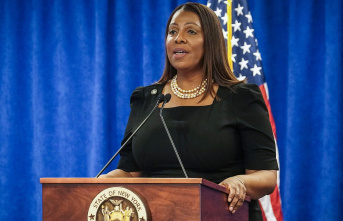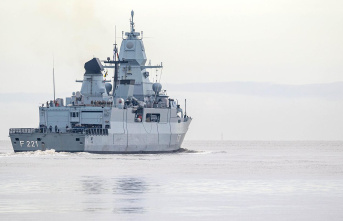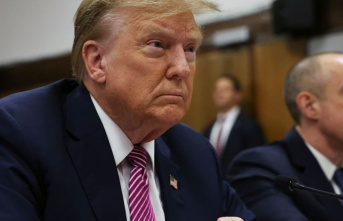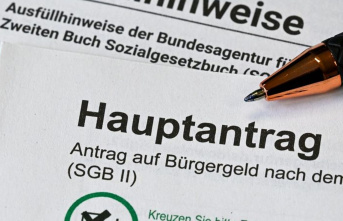At a state ceremony in the Kremlin, Russian President Vladimir Putin and China's head of state and party leader Xi Jinping reaffirmed their strategic partnership with new agreements. Russia's state television broadcast the ceremony. Two agreements have been signed on the partnership and on strategic cooperation between the neighbors until 2030, Putin said at a joint appearance. Xi praised the "constructive talks" with Putin and spoke of expanding trade and economic cooperation with Russia.
The negotiations also dealt with the war in Ukraine. Putin once again praised China's internationally skeptical Ukraine paper. "We find that many of the positions of the peace plan put forward by China are in line with Russian approaches and can be taken as a basis for a peaceful solution as soon as the West and Kiev are ready," said the 70-year-old. He spoke of "warm and collegial" talks with his 69-year-old friend Xi. China had proposed a ceasefire and peace talks.
Kremlin spokesman Dmitry Peskov said Putin and Xi had already discussed Ukraine for four and a half hours on Monday. Both also had dinner. "There was an opportunity to clarify everything," said Peskow. "They listened to each other, that's the most important thing."
According to the Russian translation, Xi said China adheres to "the goals and principles of the UN Charter". At the same time, with regard to the war in Ukraine, which Putin ordered more than a year ago, he emphasized that his country was taking an "objective and impartial position". For international observers, however, China is by no means a neutral authority. Nothing became known about possible arms and ammunition deliveries from China to Russia.
Xi arrived in Moscow on Monday and is expected to stay until Wednesday. The visit from Beijing was also convenient for Putin because it shows that he is not internationally isolated - despite the arrest warrant issued against Putin by the International Criminal Court in The Hague. The Kremlin expressed doubts that Xi would also speak to Ukrainian President Volodymyr Zelenskyy immediately after his state visit. Ukraine had shown interest in such an exchange.
Joint declaration on international issues
According to Russian news agencies, Putin and Xi also issued a joint statement on international issues. Accordingly, they demanded an objective clarification of the explosions on the Baltic Sea pipelines Nord Stream 1 and 2. They spoke out against US dominance and for a multipolar world order. They emphasized that their strategic partnership is not a military-political bloc. Their cooperation is not directed against other states, it said.
At the same time, they called on the United States to abandon a global missile defense system. Accordingly, Washington should also refrain from taking steps to destabilize strategic security in the world, it said. For example, nuclear powers should not station their nuclear weapons in third countries. Russia has repeatedly called for US nuclear weapons to be withdrawn from Germany.
Putin speaks of a successful meeting
Kremlin chief Putin spoke of a successful meeting. According to Russian experts, Xi completed his most important mission immediately after his arrival on Monday. With his demonstrative support for Putin, Xi not only gave the official start of the presidential election campaign for Russia, said the political scientist Sergei Malakhov. He is also the signal to the international community that the Kremlin boss is staying. "China has effectively brushed aside the question of international isolation," Malakhov told the Vedomosti newspaper.
Xi practically congratulated Putin on Monday on winning next year's presidential election, although he has not even declared his candidacy yet. And on Tuesday he invited Putin and Prime Minister Mikhail Mishustin to a return visit to Beijing. The message to the West: China is counting on Putin as the guarantor of an anti-liberal front against the West for the long term. Putin and Xi have repeatedly made it clear that they advocate a new multipolar world order without US dominance.
Xi on state visit to Putin: "Historical logic"
It is "historical logic" that he chose Russia for his first post-election visit because both big countries are neighbors and "strategic partners," Xi said. For example, Russia is increasingly relying on reserves in the Chinese currency yuan for its currency reserves. China benefits from the expansion of economic relations with Russia. Despite the Ukraine war, the People's Republic continues to obtain cheap gas from the neighboring country. At the same time, Chinese companies are penetrating markets that were previously occupied by Western companies in Russia.
However, Beijing is careful not to violate sanctions, at least not in an obvious way. The West should not be given any reason to direct its economic coercive measures against China. "But almost everything that is somehow possible in trade is done," says a Western business representative in Beijing about the current dynamics in Russian-Chinese trade.
In his view, by helping Russia, Beijing is also protecting its own security interests. China doesn't want to see unrest in Russia or even a fall of Putin. After all, both states share a border that is more than 4,000 kilometers long. From the Chinese point of view, the worst would be a neighbor who, under new leadership, turns to the West.
But supporting Russia is a double-edged sword. In Beijing, for example, it is observed with concern that most European countries, including Germany, are aligning themselves even more closely with the United States as a result of the Ukraine war. While the tensions with Washington seem insurmountable, China has so far hoped for at least more cooperation with Europe, which is an even more important trading partner for the People's Republic than Russia.
With a diplomatic contribution to ending the war, the Chinese leadership could win back the respect of the Europeans. It also seems clear that China's economic weight alone could persuade Russia to make concessions. But Beijing seems to be taking a different approach.











